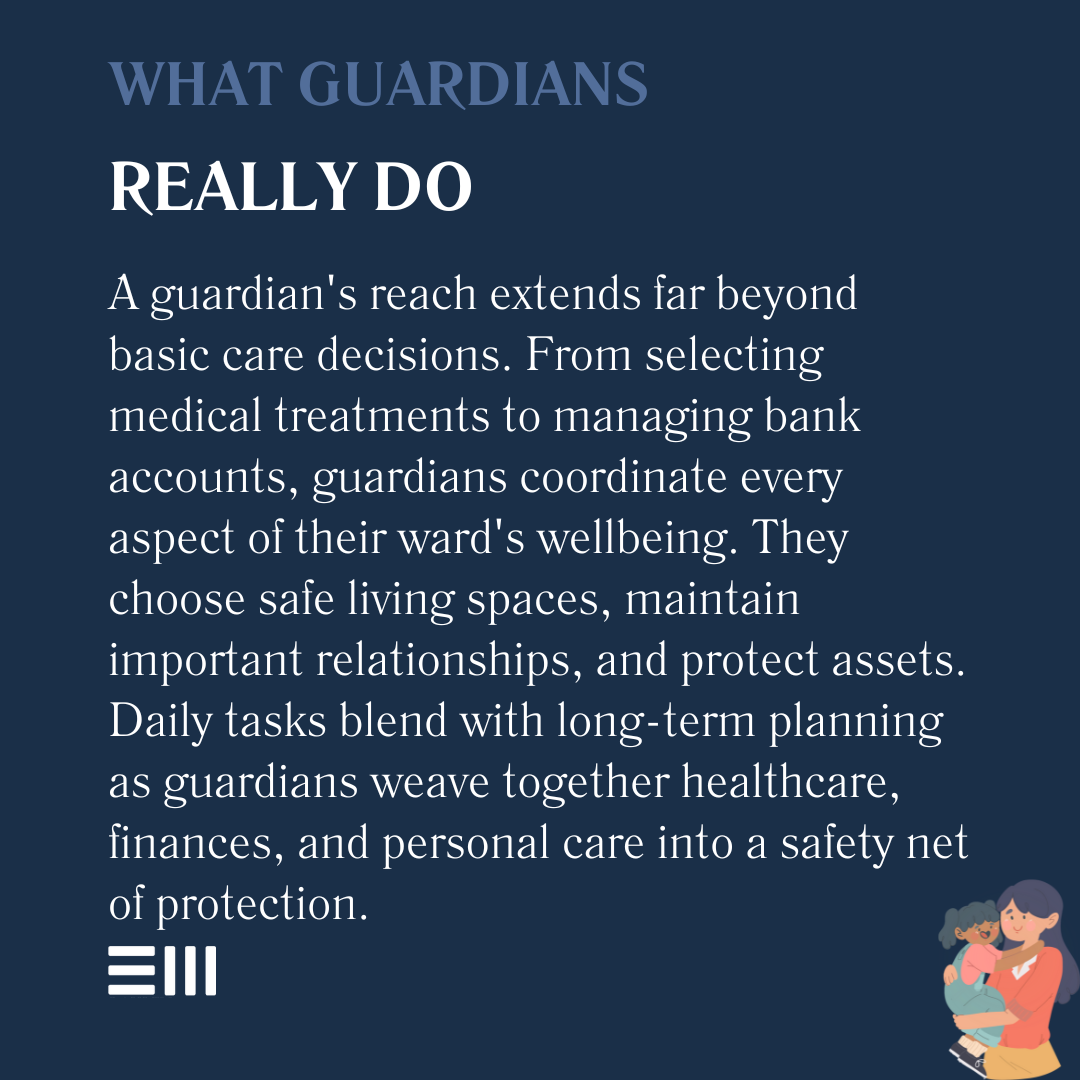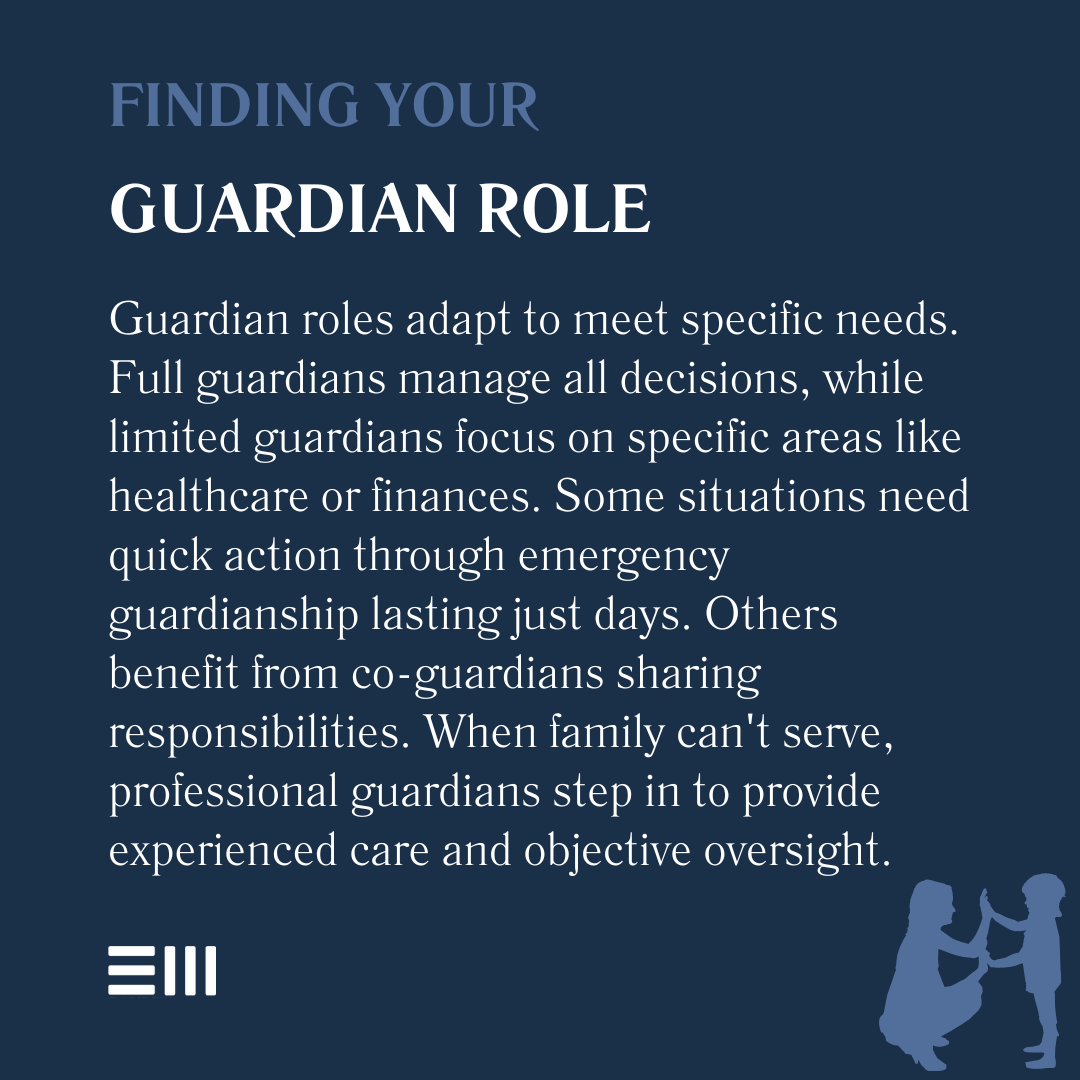Every unprotected credit card charge, untaken medication, or missed doctor's appointment can mark the moment a family realizes their loved one needs more than gentle reminders and occasional help.
Behind closed doors across America, these quiet revelations transform ordinary family members into guardians, stepping forward to provide legal protection and dedicated care for those who can no longer fully protect themselves.
Understanding Guardianship
Every guardianship case reflects a unique story of families seeking to protect and support those who can no longer fully care for themselves. The legal framework of guardianship in Alabama provides structure and protection for these delicate situations.
Key aspects of guardianship include:
- Legal authority that grants decision-making power over medical, financial, and personal matters for someone unable to manage these decisions independently, ensuring timely responses to healthcare needs and financial obligations;
- Court oversight ensuring proper care and preventing potential abuse through regular reviews and reports, with judges monitoring the guardian's decisions and actions;
- Protected rights maintaining the ward's dignity by preserving their ability to make decisions in areas where they remain capable, such as daily activities or social relationships;
- Family involvement encouraging collaboration between family members and medical professionals to ensure comprehensive care and consistent support; and
- Professional support from attorneys, social workers, and healthcare providers who help navigate complex decisions and requirements.
Understanding these fundamental elements helps families navigate the path forward with confidence and clarity while ensuring proper protection for their loved ones.
Types of Guardianship
Different life situations require different levels of support and protection. Recognizing these distinctions helps families choose the most appropriate arrangement.
Common guardianship arrangements include:
- Full guardianship offering comprehensive decision-making authority for all aspects of the ward's life, suitable for those who cannot manage any personal affairs;
- Limited guardianship preserving specific rights while providing protection in targeted areas, allowing independence in areas where capacity remains;
- Temporary guardianship addressing immediate needs while permanent solutions develop, often used during medical emergencies or family transitions;
- Emergency guardianship responding to urgent situations requiring immediate intervention, lasting up to 15 days with possible extensions;
- Co-guardianship allowing multiple guardians to share responsibilities and decision-making authority; and
- Professional guardianship utilizing trained individuals when family members cannot serve or conflicts exist.
Each type serves distinct needs while maintaining appropriate protections for all involved parties and adapting to specific circumstances.
The Impact of Guardianship
Understanding how guardianship affects daily life helps families prepare for their new responsibilities and relationships.
Significant areas of impact include:
- Healthcare management ensuring proper medical care and treatment decisions;
- Financial oversight protecting assets and managing daily expenses;
- Living arrangements selecting appropriate housing and care facilities;
- Personal care coordinating daily activities and support services;
- Social relationships maintaining connections with family and friends;
- Legal representation protecting rights and interests in legal matters;
- Educational decisions supporting continued learning and development; and
- Treatment choices managing mental health and medical care options.
These responsibilities require careful attention to both immediate needs and long-term planning considerations.
When Is Guardianship Necessary?
Recognizing the right time for guardianship involves careful observation and honest assessment of a loved one's capabilities.
Signs that might indicate a need for guardianship include:
- Consistent difficulty managing daily tasks or personal care, such as forgetting medications or neglecting hygiene;
- Repeated financial mistakes or vulnerability to exploitation, including unusual purchases or missing funds;
- Declining ability to understand medical decisions or communicate health preferences;
- Increased risk of self-harm or unsafe living conditions requiring immediate intervention;
- Progressive cognitive decline affecting judgment and decision-making abilities;
- Vulnerability to financial scams or undue influence from others;
- Inability to maintain safe living conditions or basic self-care; and
- Frequent confusion about important personal matters or obligations.
Identifying these patterns early helps families take proactive steps to ensure proper care and protection.
Legal Requirements and Process
Establishing guardianship involves specific legal steps designed to protect all parties' rights and interests.
The process typically includes:
- Filing a detailed petition with the appropriate court;
- Providing medical documentation of incapacity;
- Notifying all interested parties of the proceedings;
- Attending court hearings and presenting evidence;
- Completing guardian training if required;
- Establishing reporting procedures and schedules;
- Meeting with court-appointed investigators or evaluators; and
- Creating initial care and financial management plans.
Understanding these requirements helps families prepare for the legal process ahead.
Benefits and Limitations
Understanding both the advantages and restrictions of guardianship helps families make informed decisions about their loved one's care.
Important considerations include:
- Legal protection against financial exploitation and medical neglect through court oversight;
- Structured decision-making ensuring consistent care approaches across all aspects of life;
- Regular court review maintaining accountability and oversight of guardian actions;
- Resource access helping guardians navigate healthcare and social services effectively;
- Privacy protection keeping sensitive personal matters confidential while ensuring proper care;
- Professional support providing access to legal and medical expertise;
- Family coordination improving communication and care consistency; and
- Asset protection safeguarding financial resources and property.
These factors work together to create a comprehensive support system for vulnerable individuals while maintaining appropriate oversight.
Commonly Asked Questions About Guardianship in Alabama
Each family's journey through guardianship in Alabama presents unique challenges.
These questions address common concerns that arise during the process.
How Does Guardianship Affect Personal Rights?
Courts carefully balance protection with personal autonomy, preserving rights wherever possible while ensuring necessary oversight.
What Responsibilities Come With Being a Guardian?
Guardians manage healthcare decisions, living arrangements, and sometimes financial matters while reporting regularly to the court.
How Long Does Guardianship Last?
Guardianship typically continues until the ward regains capacity or passes away, though courts can modify arrangements as needed.
Can Family Members Disagree About Guardianship?
Courts consider all interested parties' input while focusing on the ward's best interests when making decisions.
What Alternatives Exist to Guardianship?
Power of attorney, advance directives, and supported decision-making arrangements might meet some families' needs.
Your Next Steps Matter
Protecting your loved one's future starts with understanding your options.
Our experienced legal team can help you navigate the guardianship process while ensuring your family member receives the care and protection they deserve.
Contact us to discuss your situation and explore the best path forward.


